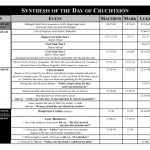Why Are They So Smug?
It’s frustrating, sometimes, to listen to atheists pontificate about Jesus as though He’s nothing more than a myth crafted by weak minded individuals who are desperately trying to craft a religious sounding narrative that helps them cope with their own mortality.
And what makes it so frustrating is that they’re so smug, even to the point of being condescending. It’s as if evidence that has been revealed and elaborated on throughout the centuries either doesn’t exist or, if it does exist, it’s dismissed with a wave of a liberal professor’s hand and the arrogant laughter of his like-minded fans.

click here to view a synthesis of Christ’s trial and crucifixion as documented in the Gospels (courtesy the “Reagan Review“)
Today is Good Friday. It’s 4:30 in the morning. According to my creed, if we were to wind the clock back some 2,019 years ago, in four and a half hours they’re going to put my Messiah to death. He’s been up all night, having to contend with a bogus trial at the hands of the religious authorities who are unwittingly fulfilling prophecies that had been articulated several centuries prior to this particular day (Psalm 22:16; 35:11; Is 53:8).
The Bible is amazing in the way it’s shaped. It’s as though you’re listening to a piece of music that, through various movements of major and minor tonalities, crescendos to this dark and dramatic scene where all that is evil and all that is good lock horns and you hold your breath wondering what is going to be the outcome.
But it’s more than just a soundtrack that accompanies a great story. The crucifixion of Christ represents, not only the final defeat of death and sin, it’s the most noble act of selfless love the world will ever see.
Even if you don’t believe in Christ, the sentiment represented by a holy God enduring an excruciating death deserves at least a respectful disposition, wouldn’t you think?
But that’s not what you get with the vast majority of critics – be they atheists or “scholars” – that present their arguments with a healthy dose of sarcasm.
Pause for a minute…
That’s my King being flogged, mocked and pinned to the cross with spikes through His hands and heels. He’s not some tragic figure. He’s not delusional. He’s God Almighty. When God saved Noah and his family, He knew at that point that Noah’s three sons represented the descendants of those who would one day subject His Son to a horrible death.
Some look at the story of Noah and accuse God of being an absent minded doofus. Why save a handful of people and destroy millions if that handful would go on to produce a populace more wicked than the first? Did He not know what He was doing?
That’s the wrong question.
The real question is why didn’t He destroy all of humanity at that point and be done with it? He knew the price He would have to pay by keeping humanity on the screen. Yet, He did so. Not because He was confused, but because He loved His creation enough to watch His Son die for them.
I’ve recently encountered a gentleman by the name of Dr Robert Price. He’s a very educated man with several academic credentials that would suggest he’s a staunch defender of the Christian faith.
But he’s the exact opposite.
He insists that the whole of Scripture is a fable and that Jesus is a myth.
But his platform is littered with holes and a confidence that seems ill founded.
He has a book out called, “The Case Against the Case for Christ.” It’s positioned as a refutation of Lee Strobel’s book, “The Case For Christ.”
He begins by lumping Strobel into a category of apologists that have no real credibility because they all begin with a premise that says the Bible is true. Hence their findings are filtered through a predisposition that doesn’t allow for critical thinking.
But if you know anything about Lee Strobel, you know that this man was the legal editor of the Chicago Tribune. He was a confident atheist and, when his wife got saved, he was determined to reveal the resurrection of Christ as a hoax so he could get his wife back. Strobel was anything but your typical “apologist.” He was determined to disprove the resurrection and not validate it as a historical event.
At one point, Price dismisses the accomplishments of Dr. William F. Albright as nothing more than the work of a “Presbyterian.”
William F. Albright, PhD, LttD was the W.M. Spence Professor of Semitic Languages and Chairman, Oriental Seminary at John Hopkins University. He taught at John Hopkins from 1929 to 1958. He was President of the International Organization of Old Testament Scholars, director of the American School of Oriental Research in Jerusalem, and lead a number of archaeological expeditions in the Middle East. He wrote more than 800 publications and became a public figure as a result of his participating in authenticating the Dead Sea Scrolls. He was a strong advocate for the idea that archaeology proved the authenticity of the Bible,
But in the mind of Price, he’s just a Presbyterian.
Price goes on to say that Nazareth never existed, which is a conclusion that can only be drawn if you’re resolved to ignore certain discoveries that prove its existence.
He also says the the Bible is “swarming with contradictions.” No doubt he’s familiar with Dr Gleason’s explanation of many of these situations in his book the “Encyclopedia of Biblical Difficulties.” (click here to read more about Dr. Gleason’s work and credentials)
There’s a difference between reading the Bible and studying it, just like there’s a difference between someone who’s looking for truth and that person who’s simply looking for excuses.
Jesus didn’t take any selfies when He existed the tomb. We don’t have footage of the early disciples nor do have any photographs of King David. All we have is 2,000 years worth of art, architecture, music, archaeology, history, literature and over two millennium of dramatically changed lives. Yes, it’s compelling but we’re still looking at the actual events from a distance.
We can’t touch the cross, we can’t view the resurrection…
But we can access the evidence…
We can acknowledge the grandeur of creation (Rom 1:20), we can admit our own imperfections (Rom 3:23), we can note the reality of death (Heb 9:27), we can concede the necessity of moral absolutes (Jud 21:25), we can respect the selfless-ness advocated in the Scriptures (Matt 7:12; Phil 2:3).
Or…
We can be smug and veil the lack of credibility and logical substance that characterizes our arguments by punctuating our platform with cynicism, half truths and a philosophical paradigm that refuses to acknowledge no absolute save the absolute of one’s self.
That’s it right there…
“You will not surely die,” the serpent said to the woman. “For God knows that when you eat of it your eyes will be opened, and you will be like God, knowing good and evil.” (Gen 3:4-5)
It’s more than just an academic disposition, it’s a spiritual condition.
Why are they so smug?
Because they are their own god.
And there but for the grace of God go I…
It’s 6:30 now. In two and a half hours, He allows Himself to be pinned to that crossbeam where He’ll stay for six hours before He breathes His last and says, “It is finished.”
And He’s doing that for and because of me.
I may not be able to change the minds of those who view the Reality of Christ with a smug disdain. But I can stay aware of Who my God is and what He did on this day over 2,000 years ago.
Happy Easter!








Leave a Reply
Want to join the discussion?Feel free to contribute!